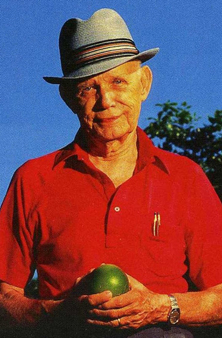
Dr. James “Jim” Griffiths, Jr. (1914-2006)
Inducted 1998
Highlights
Florida Citrus Mutual
Citrus Grower Associates
Florida Research Advisory Council
Spreading Decline Committee
Young Tree Decline Committee
Citrus Harvesting Committee
International Society of Citriculutre
Soil Science of Florida
Entomological Society of America
Florida Entomological Society
Florida Citrus Production Managers Association
Florida Citrus Processors Association
Florida Citrus Research Foundation
Polk County Water Policy Committee
Greenbelt Assessment
Lake Alfred Citrus Experiment Station
Lyon’s Fertilizer Company
Bio
James “Jim” Griffiths, Jr. made enormous contributions to the Florida citrus industry though his persistent pursuit of knowledge and dedication in sharing that knowledge with others. Using his talents as a citrus grower, scientific researcher, and advocate, Griffiths helped make Florida citrus profitable, manageable, and marketable for industry men and farmers alike.
Born in Alta Loma, Texas, on November 4, 1914, the son of a rancher, Griffiths worked on the ranch with his father until entering Rice University. After earning a degree in zoological sciences in 1937, Griffiths married and shortly thereafter entered Iowa State University, earning a doctorate in Entomology in 1941. After taking an academic appointment at Auburn University Griffiths volunteered for the army, entering in as a First Lieutenant. Griffiths was stationed in the Pacific Theater during World War Two and his expertise made him useful in treating soldiers suffering from ailments caused by insects. By the end of the war Griffiths had been promoted to Captain and by that time he found himself in Yokohama, Japan.
In 1946 Griffiths found his best employment opportunity was in Florida. He took a job at the Citrus Experiment Station at Lake Alfred. He quickly established himself as an expert in the field of biological control mechanisms through extensive research projects. Before leaving the Experimental Station in 1951 to take a position at Lyon’s Fertilizer Company, he had either authored or co-authored at least seventy-five articles in citrus reports and scientific journals discussing and evaluating new insecticides and fertilizers, and giving precise recommendations for their application in fighting pests or nutrient deficiencies.
During his three year tenure at Lyons, Jim traveled the state, offering farmers first-hand knowledge into a broad range of problems. In 1954 his biggest customer John Snively, convinced him to join his company, Eloise Groves Association as production manager of the processing plant and overseer of grove operations. Griffiths’s ingenuity proved critical. After the freezes of 1957-58, he conducted research on the use of wind machines for cold protection. This eventually rendered the burning of oil and wood in open pots obsolete. While Griffiths was with John Snively’s company, he played a fundamental role in developing a market for what was then a newly available product: orange juice as a frozen concentrate. Even after leaving, he continued to assist in quality improvement which banned the use of pulpwash, restricted the use of low quality fruit, and raised brix levels. In turn, this dramatically boosted Florida’s reputation in the Citrus world as well as the price of concentrate. From 1962-67 Griffiths worked as the General Manager of Cypress Gardens Citrus Products, before serving as the director of special projects for Florida Citrus Mutual from 1968-81, where he aggressively tackled whatever problems the industry as a whole was facing at the time.
No matter who Griffiths worked for, he was always one of the most well informed, willing advocates for the livelihood of Florida citrus farmers and the industry. He made it a habit of joining every committee and attending every industry meeting he possibly could. When the Environmental Protection Agency entered the scene in 1970, Griffiths was in both Tallahassee and Washington fighting for water rights and the use of important pesticides on the behalf of growers. He fought off many regulations which had little or no scientific bearing including the Clean Air Act being applied to farmers. He also appeared in local cases, most notably as an expert witness and advisor for farmers in central Florida against the phosphate mining industry for contamination of citrus crops with harmful by-product pollutants.
Over the years, many organizations have benefited from Griffiths’s vast knowledge and bold leadership approach, which always pressured decision makers to look at the industry more broadly and critically. Griffiths served on the Florida Research Advisory Council, the Spreading Decline committee, the Young Tree Decline Committee and at one point he headed the Citrus Harvesting Committee. Griffiths was also a member of the International Society of Citriculture, the Florida State Horticultural Society, the Soil Science Society of Florida, the Entomological Society of America, the Florida Entomological Society, the Florida Farm Bureau, the Institute of Food Technologists, the Florida Citrus Production Managers Association, the Florida Citrus Processors Association, and he was a long time board member of the Florida Citrus Research Foundation. In efforts to improve water quality, he lobbied for the inclusion of the Ridge area into the SW Florida Water Management District, and for the establishment of the Polk County Water Policy Committee on which he served from 2001-06. To insure a just taxation for Florida farmers so that they could compete with foreign market, he worked closely alongside the Department of Revenue for standardized greenbelt assessments.
In spite of all his influence, Griffiths’s first love was always growing citrus–something he began doing in the 1950’s and continued doing up until the end of his life. After retiring from Florida Citrus Mutual, Griffiths began writing a weekly newsletter to offer citrus farmers the latest news which affected their crops. He also founded the Citrus Grower Associates, which is a small cooperative of growers aimed at promoting and protecting its local grower participants.
James Griffiths will be remembered as a man who enjoyed a challenge, who never stepped away from his beliefs, and whose energy gave much knowledge and vitality to the Florida citrus industry.
